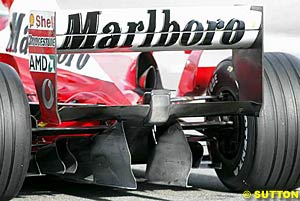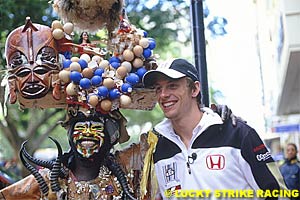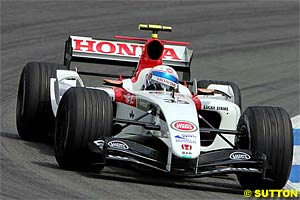Atlas F1 Magazine Writer
Fresh from the Formula One paddock
When does a Grand Prix start? According to FIA regulations, the event starts at 15:00 (or whenever the first official media conference is called) on Thursday; certainly, the sport's governing body has every right to demand the presence of drivers and team members on that day.
In Australia, for legal purposes, the event legally starts on the Friday - from which, for three days, Formula One is exempt from the stringent tobacco laws prevailing in Melbourne's state, Victoria. Other tobacco-banning countries generally follow that rule, although, in some instances, exemptions come into effect on Thursday; in others, the entire Grand Prix week 'enjoys' - if that be the correct word when discussing such a contentious issue - legal waivers.
But, in Belgium, Grand Prix proceedings - for a race to be held on 29 August - begin no less than 30 days beforehand, or so Philip Morris, owners of the Ferrari-sponsoring Marlboro brand, would have us believe.
"A total flouting of the law," the anti-tobacco coalition is screaming. "Exemptions apply only to the two or three days of the Grand Prix, so it is a breach of the law to advertise a month before the race," says Luc Joosens, a spokesman for the coalition.
"Not so," say the cigarette purveyors, who believe that the exemption is not time- nor, seemingly, territory-bound. "The exemption applies to all world-class events, and the Grand Prix is plainly a world-class event."
At the heart of the matter lies a law taking its name from the circuit, 'Francorchampswet', which was passed on 26 August 2003 - after the local population realised Bernie Ecclestone was absolutely serious about bypassing Belgium in 2003 and beyond unless tobacco livery was permitted. But, this law has apparently been loosely framed, allowing Philip Morris's lawyers to drive two blood-red, Marlboro-liveried Ferraris straight through it at full power.
As it stands, Francorchamps law extends to the end of July 2005, which is when Europe's exemptionless ban on tobacco advertising comes into full effect. So this was in effect a full-blown national law passed for the sake of one Grand Prix, in August 2004, or - should Ecclestone schedule another Belgian race before the ban next year - two at most.
But now, in the light of Marlboro's campaign, the anti-tobacco coalition is threatening legal action, which could just see the exemption overturned completely. Matters are, of course, complicated by the political situation in the country, and the government of Wallonia, in whose French-speaking region the track resides, was forced to pull in numerous favours from the Flemish and German areas to gain the exemptions.
The Belgian national motorsport authority seems rather sanguine about the matter. "This year's Grand Prix is not in any danger," said Coen Weijkmans, communications manager for the Royal Automobile Club Belgium, adding that "this is a matter between the cigarette companies and the law." But, should the anti-tobacco coalition win the case, Francorchamps law could well be overturned and not be redrafted to cater for a race in 2005.
That could mean Good-Bye Spa again - this time for ever, for Bernie Ecclestone is unlikely to view favourably a second dispute over the same matter, particularly if Wallonia does not get a second chance from opposing politicians.
If Jenson Button's German Grand Prix was hectic - what with being fastest man on the track at various points during the preliminaries, being docked 10 qualifying slots to 13th due to a failed valve, then fighting back to a fine second after leading on three occasions - it paled into virtual boredom when compared with a promotional trip the young Brit undertook to South Africa just a day later.
Flying First Class (would any self-respecting GP driver turn right at the aircraft door?), the BAR-Honda driver left London for Cape Town on Monday, arriving at the crack of dawn on Tuesday. En route to the first Lucky Strike promotional venue - there were four during a 6 hour period - he was flown by helicopter over the city's iconic Table Mountain and shown Robben Island, which housed former president Nelson Mandela for 27 years, from the air.
On the dot 17:00 a close was called to proceedings, but not before JB had informed, in reply to a question about future challenges, that the biggest threat would come not from Kimi Raikkonen or Fernando Alonso or Juan-Pablo Montoya, all of whom he rated as 'fast', but from one Mark Webber.
"I've worked out with Mark," he said of the Australian, whose move to Williams was confirmed that same day, "and the amount of effort he puts into his training is incredible. Speed is one thing, but effort is another, and I've been with him, and can tell you he works really, really hard..."
They were, of course, teammates in 2001, when Button was a Benetton (Renault) man, and Webber was third driver for the team managed by his manager, Flavio Briatore. A clear line runs through this lot: JB was replaced by Juan Pablo Montoya at Williams, was at Benetton-Renault for two years, only to be replaced by Fernando Alonso, and, of course, was managed by the Robertson father-and-son act, which tend Kimi Raikkonen. So, for a man who was constantly replaced in his early days, Button has come a long way. Equally telling is that no mention was made about former teammates Ralf Schumacher, Jarno Trulli and Giancarlo Fisichella when asked the question...
A quick shower and change into civilian clothes at a waterfront hotel, then off by car to Cape Town's airport for the overnight trip to his home in Monaco (to spend time with various water toys in Med) it was more live radio crossings, and (just) time to answer 10 fun questions on the hoof:
Q: What make of car do you presently drive on the road?
Button: "Honda."
Q: Which one and why do you drive that one?
Button: "NSX, because that's the one in my garage, but I chose it because it was designed with input from Ayrton Senna."
Q: Is it your dream car?
Button: "Yes, it is my dream car!"
Q: What cars do your father and fiance drive?
Button: "Dad - a '57 Corvette which I gave him for his birthday; Louise - don't want to say, that is her business."
Q: What was the first car you ever drove, how old where you and where was it?
Button: "Suzuki Jeep in a muddy field at age 15. I remember doing a lot of doughnuts!"
Q: In what car did you get your driver's licence?
Button: "Nissan Micra Diesel which belonged to the driving school."
Q: Which is your favourite bit of road, and why?
Button: "Beckett's at Silverstone; I leave 'why' to your imagination."
Q: What is the fastest you have ever driven on a public road?
Button: "I was caught at over 200km/h in France in 2000. Never again!"
Q: What is the most you would ever spend on a car?
Button: "Nothing - no need for it... I don't drive myself often. That's why it's great to work with Honda; get my cars for free!"
Q: What would you be doing for a living had you not become an F1 driver?
Button: "Cannot imagine doing anything other than F1 - been my dream since I can remember."
Speaking of BAR-Honda, what chance is there of the team winning its appeal in Paris next Monday? Very little, frankly, if statistics be the measure.
The matter started on Friday morning in Germany when the team ran front axle connecting shafts operating through hydro-electronic systems to control front torque transfer. Designed to overcome the effects of chassis ‘twist' under turn-in braking, FTT, as Benetton dubbed its (banned) system five years ago, allows later and harder braking with minimised unloaded wheel lock up.
(Brawn, also an ex-Head staffer, has denied Ferrari drew the FIA's attention to BAR's componentry, and the mere fact that he commented is an indicator as to just how far BAR has progressed during this season...)
Two aspects are of interest: that the system was fitted to Anthony Davidson's car, then found to be illegal on the Friday, proving that the FIA does, despite rumours to the contrary, scrutineer third cars as stringently as it does the others; and that BAR is sufficiently confident of its case to progress the issue despite no race results (or championship points) being at stake.
Of course, on Monday, the FIA may uphold the decision and impose any penalty it sees fit, whereas in Germany the team was merely reprimanded and ordered to remove FTT. As Eddie Irvine discovered when he appealed a race ban in 1994, the FIA can (and does) triple its punishments, and so the governing body could well enforce further penalties.
Race bans are unlikely, but a fine could well be imposed and, of course, if it loses, BAR could be ordered to pay the costs - risks that Willis and team principal David Richards, who is an experienced motorsport administrator, are well aware of. So why run these risks when the system is believed by most to be illegal? When BAR 006 is, in any event, fast enough for pole ("I made a small mistake during Qualifying, and, but for my fuel load, could have taken pole in Germany," said Jenson Button in South Africa afterwards)?
It could all be a matter of pride - something BAR distinctly lacked until recently - or a matter of rules interpretation, as happens in courts all over the world on a daily basis. Finally, though, it could be a sign of future and further technical developments, all of which, crucially, depend upon the system being pronounced legal.
Somehow the latter is the preferred option, for the team has recently made massive progress with innovative technology, all paid for by a swelling sponsorship portfolio. None of this, though, alters the statistics: since 1975 only two Formula One-centric appeals have been successful - McLaren in 1976 (against James Hunt's Spanish exclusion, which, as may be noted, was way before Ron Dennis' tenure), and Ferrari's Bargeboard affair in 1999. During that time approximately 50 F1-related appeals have been heard, thus giving BAR no more than a 4% chance of winning in Paris on Monday...

 For a week now the company has been erecting 10 square metre billboards throughout the host country, starting at airports, and extending into Brussels and surrounding towns, none of which are in close proximity to the sinuous circuit lying deep in the brooding Ardennes forests.
For a week now the company has been erecting 10 square metre billboards throughout the host country, starting at airports, and extending into Brussels and surrounding towns, none of which are in close proximity to the sinuous circuit lying deep in the brooding Ardennes forests.

 Then a fleet of Hondas ensured he arrived timeously at each subsequent venue, which was no mean feat given that the traffic in the country's Mother City rates amongst the most undisciplined in the world (ask Mercedes, who had one of its McLaren SLR coupes written off within a few hours of arriving for the world-wide launch last year). Live radio interviews being conducted on mobile phones between visits, and the schedule at each HORECA (hotel, restaurant, cafe) was no walk-over, either: meet ‘n greet, autographs, photo shoots, invariable interviews; off to the next place with hardly a break.
Then a fleet of Hondas ensured he arrived timeously at each subsequent venue, which was no mean feat given that the traffic in the country's Mother City rates amongst the most undisciplined in the world (ask Mercedes, who had one of its McLaren SLR coupes written off within a few hours of arriving for the world-wide launch last year). Live radio interviews being conducted on mobile phones between visits, and the schedule at each HORECA (hotel, restaurant, cafe) was no walk-over, either: meet ‘n greet, autographs, photo shoots, invariable interviews; off to the next place with hardly a break.

 BAR, though, believes its system - which differs fundamentally from Benetton's mechanical design - to be legal, despite Ross Brawn's suggestion that "maybe (Technical Director) Geoff Willis wasn't around in those days..." (which, as Williams' Patrick Head, for whom Willis worked as joint designer until end-2001, can attest, he was) and is taking the matter to the FIA's Appeal Court.
BAR, though, believes its system - which differs fundamentally from Benetton's mechanical design - to be legal, despite Ross Brawn's suggestion that "maybe (Technical Director) Geoff Willis wasn't around in those days..." (which, as Williams' Patrick Head, for whom Willis worked as joint designer until end-2001, can attest, he was) and is taking the matter to the FIA's Appeal Court.
|
Contact the Author Contact the Editor |
Please Contact Us for permission to republish this or any other material from Atlas F1.
|
Volume 10, Issue 31
Atlas F1 Special
The Stars Align
Boy Wonder
In Search of the Holy Grail
Chemistry Cocktail
The Conservative Party
The Reshuffle: Facts & Stats
The Reshuffle Trivia Quiz
Columns
On The Road
Elsewhere in Racing
The Weekly Grapevine
> Homepage |
